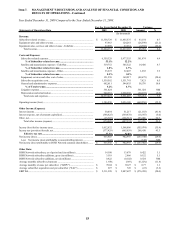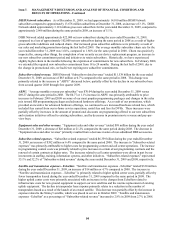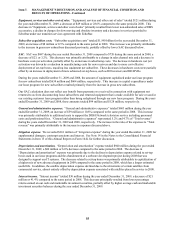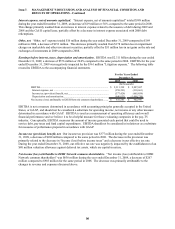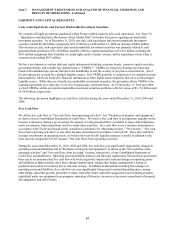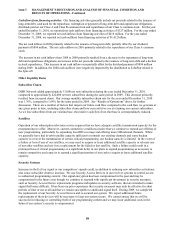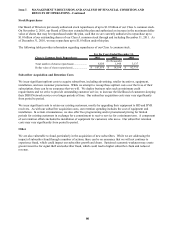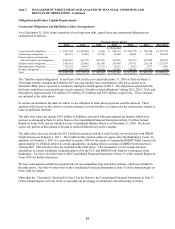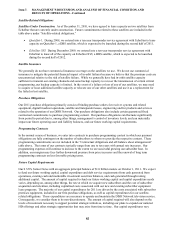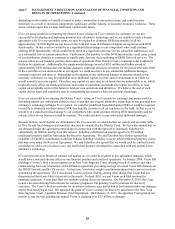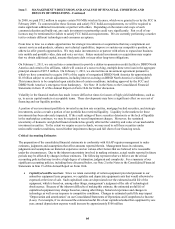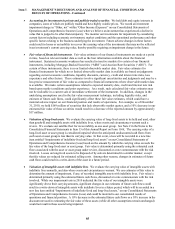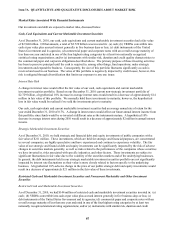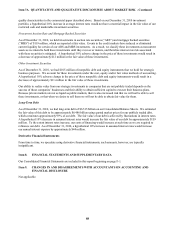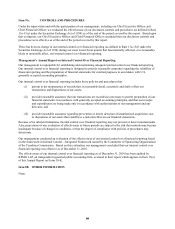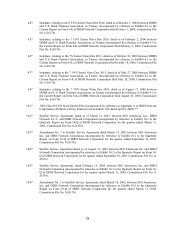Dish Network 2010 Annual Report Download - page 70
Download and view the complete annual report
Please find page 70 of the 2010 Dish Network annual report below. You can navigate through the pages in the report by either clicking on the pages listed below, or by using the keyword search tool below to find specific information within the annual report.Item 7. MANAGEMENT’S DISCUSSION AND ANALYSIS OF FINANCIAL CONDITION AND
RESULTS OF OPERATIONS - Continued
63
63
depending on the number of satellites leased or under construction at any point in time, and could increase
materially as a result of increased competition, significant satellite failures, or sustained economic weakness. These
factors could require that we raise additional capital in the future.
If we are unsuccessful in overturning the District Court’s ruling on Tivo’s motion for contempt, we are not
successful in developing and deploying potential new alternative technology and we are unable to reach a license
agreement with Tivo on reasonable terms, we may be required to eliminate DVR functionality in all but
approximately 192,000 digital set-top boxes in the field and cease distribution of digital set-top boxes with DVR
functionality. In that event we would be at a significant disadvantage to our competitors who could continue
offering DVR functionality, which would likely result in a significant decrease in new subscriber additions as well
as a substantial loss of current subscribers. Furthermore, the inability to offer DVR functionality could cause certain
of our distribution channels to terminate or significantly decrease their marketing of DISH Network services. The
adverse effect on our financial position and results of operations if the District Court’s contempt order is upheld is
likely to be significant. Additionally, the supplemental damage award of $103 million and further award of
approximately $200 million does not include damages, contempt sanctions or interest for the period after June 2009.
In the event that we are unsuccessful in our appeal, we could also have to pay substantial additional damages,
contempt sanctions and interest. Depending on the amount of any additional damage or sanction award or any
monetary settlement, we may be required to raise additional capital at a time and in circumstances in which we
would normally not raise capital. Therefore, any capital we raise may be on terms that are unfavorable to us, which
might adversely affect our financial position and results of operations and might also impair our ability to raise
capital on acceptable terms in the future to fund our own operations and initiatives. We believe the cost of such
capital and its terms and conditions may be substantially less attractive than our previous financings.
If we are successful in overturning the District Court’s ruling on Tivo’s motion for contempt, but unsuccessful in
defending against any subsequent claim in a new action that our original alternative technology or any potential new
alternative technology infringes Tivo’s patent, we could be prohibited from distributing DVRs or could be required
to modify or eliminate our then-current DVR functionality in some or all set-top boxes in the field. In that event we
would be at a significant disadvantage to our competitors who could continue offering DVR functionality and the
adverse effect on our business would be material. We could also have to pay substantial additional damages.
Because both we and EchoStar are defendants in the Tivo lawsuit, we and EchoStar are jointly and severally liable
to Tivo for any final damages and sanctions that may be awarded by the District Court. We have determined that we
are obligated under the agreements entered into in connection with the Spin-off to indemnify EchoStar for
substantially all liability arising from this lawsuit. EchoStar contributed an amount equal to its $5 million
intellectual property liability limit under the Receiver Agreement. We and EchoStar have further agreed that
EchoStar’s $5 million contribution would not exhaust EchoStar’s liability to us for other intellectual property claims
that may arise under the Receiver Agreement. We and EchoStar also agreed that we would each be entitled to joint
ownership of, and a cross-license to use, any intellectual property developed in connection with any potential new
alternative technology.
If Voom prevails in its breach of contract suit against us, we could be required to pay substantial damages, which
would have a material adverse affect on our financial position and results of operations. In January 2008, Voom HD
Holdings (“Voom”) filed a lawsuit against us in New York Supreme Court, alleging breach of contract and other
claims arising from our termination of the affiliation agreement governing carriage of certain Voom HD channels on
the DISH Network satellite TV service. At that time, Voom also sought a preliminary injunction to prevent us from
terminating the agreement. The Court denied Voom’s request, finding, among other things, that Voom had not
demonstrated that it was likely to prevail on the merits. In April 2010, we and Voom each filed motions for
summary judgment. Voom later filed two motions seeking discovery sanctions. On November 9, 2010, the Court
issued a decision denying both motions for summary judgment, but granting Voom’s motions for discovery
sanctions. The Court’s decision provides for an adverse inference jury instruction at trial and precludes our damages
expert from testifying at trial. We appealed the grant of Voom’s motion for discovery sanctions to the New York
State Supreme Court, Appellate Division, First Department. On February 15, 2011, the appellate Court granted our
motion to stay the trial pending our appeal. Voom is claiming over $2.5 billion in damages


